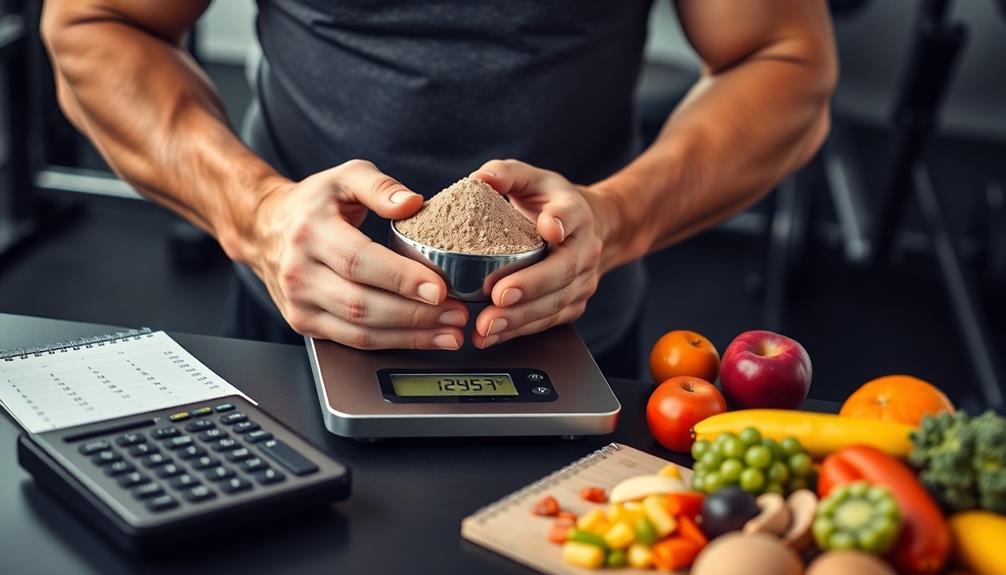To properly bulk, start by calculating your caloric surplus, adding 300-500 calories to your TDEE. Prioritize protein intake, aiming for 1.6 to 2.2 grams per kilogram of body weight daily. Implement progressive overload in your workouts, gradually increasing intensity over time. Focus on compound exercises like squats, deadlifts, and bench presses to efficiently target multiple muscle groups. Regularly monitor your progress by tracking weight, measurements, and strength gains, adjusting your plan as needed. Remember to distribute protein intake evenly throughout the day and consider supplements if necessary. These essential tips will set you on the path to effective muscle gain.
Core Insight
- Calculate and maintain a caloric surplus by adding 300-500 calories to your Total Daily Energy Expenditure.
- Consume 1.6 to 2.2 grams of protein per kilogram of body weight daily, spread evenly across meals.
- Implement progressive overload in your workouts by gradually increasing weight, reps, or sets over time.
- Focus on compound exercises like squats, deadlifts, and bench presses to efficiently target multiple muscle groups.
- Monitor progress regularly through weigh-ins, measurements, and strength gains, adjusting your plan as needed.
Calculate Your Caloric Surplus

To bulk up, you need to eat more calories than you burn. First, figure out your Total Daily Energy Expenditure (TDEE). This is the number of calories your body uses in a day. You can use an online calculator or ask a nutritionist for help.
Once you know your TDEE, add 300-500 calories to that number each day. This will give you a calorie surplus, which is what you need to gain muscle. Start with a small increase and adjust it as you go.
Keep track of how many calories you eat using a food diary or app. Weigh yourself and measure your body fat every week. This will help you see if you're gaining muscle or just fat. If you're not making progress, slowly add more calories to your diet.
Prioritize Protein Intake

Protein is the most important nutrient for building muscle when bulking. To get the best results, make protein your top priority. Aim to eat 1.6 to 2.2 grams of protein per kilogram of body weight each day. This will give your muscles enough building blocks to grow and recover.
Include protein-rich foods at every meal. Good sources are lean meats, fish, eggs, dairy, beans, and tofu. Protein supplements can also help you reach your daily goals. Look for organic protein powders with high-quality ingredients and added nutrients. Whey protein absorbs quickly, while casein protein is good to take before bed for a steady release.
Spread out your protein intake evenly over the day. This keeps a constant supply of amino acids available. It helps your muscles grow and ensures you get the most out of your bulk.
Implement Progressive Overload

To build muscle and strength, gradually make your workouts harder over time. This is called progressive overload. Choose one of these ways to do it:
- Use heavier weights in your lifts.
- Do more repetitions of each exercise.
- Add extra sets to your routine.
- Work out muscle groups more often.
Don't try to do all of these at once. Pick one and slowly increase it. For example, add 2.5-5 pounds to your lifts or one more rep to each set every week. To help you bulk up, think about adding high-protein oatmeal to your diet. It can give you up to 20 grams of protein in each serving, which can power your workouts.
Write down what you do in each workout. This will help you make sure you're always pushing yourself a little harder. Progressive overload is key for gaining muscle and strength when you're bulking.
Focus on Compound Exercises

Squats, deadlifts, and bench presses are the key exercises for bulking up. They work multiple muscles at once, helping you build muscle and strength efficiently.
Squats target your quads, glutes, and core, giving you strong legs and overall mass. Deadlifts hit your back, hamstrings, and core, improving full-body strength and posture. Bench presses focus on your chest, shoulders, and triceps for a powerful upper body.
Do these exercises 2-3 times a week, using proper form. Gradually increase the weight as you get stronger. These exercises are tough, so make sure you eat enough and rest well between workouts.
Monitor and Adjust Regularly

Keep an eye on your body while bulking – it can change over time. Track your progress to make sure you're on the right path:
- Weigh yourself each week
- Measure your body once a month
- Check how much stronger you're getting on key exercises
- Notice your energy and recovery
Use this info to adjust your plan if needed. Eating too much? Cut back on calories a bit. Not gaining enough? Slowly add more food. Think about taking HMB supplements to help build muscle and recover. As you get stronger, change up your workout intensity and volume too. Listen to your body and how it reacts. You may need to switch up your protein, carbs, and fats or when you eat. Building muscle takes time and effort. Stay patient and consistent. By keeping track and making changes, you'll keep moving towards your goal of gaining muscle.
Frequently Asked Questions
How Long Should a Typical Bulking Phase Last?
You'll typically want your bulking phase to last between 3 to 6 months. It depends on your goals, body type, and metabolism. Monitor your progress closely and adjust your diet and training accordingly for best results.
Can I Build Muscle Without Gaining Fat During a Bulk?
You can build muscle with minimal fat gain during a bulk, but it's challenging. Focus on a slight calorie surplus, prioritize protein intake, and maintain a consistent workout routine. It's called "lean bulking" or "clean bulking."
Should I Take Mass Gainer Supplements While Bulking?
You don't need mass gainer supplements for bulking. They're often high in sugar and unnecessary calories. Instead, focus on whole foods and protein-rich sources. If you're struggling to gain weight, try increasing your overall food intake naturally.
Is It Necessary to Eat Every 2-3 Hours When Bulking?
You don't need to eat every 2-3 hours when bulking. Instead, focus on your total daily calorie intake. Eating 3-4 balanced meals a day can be just as effective for gaining muscle mass and weight.
How Do I Maintain Cardiovascular Fitness While Focusing on Bulking?
You can maintain cardiovascular fitness while bulking by incorporating regular cardio sessions. Include 2-3 weekly sessions of moderate-intensity cardio, like jogging or cycling, for 20-30 minutes. Don't overdo it, as excessive cardio may hinder muscle gains.

